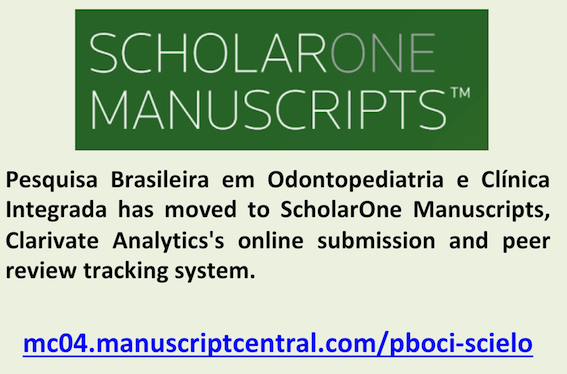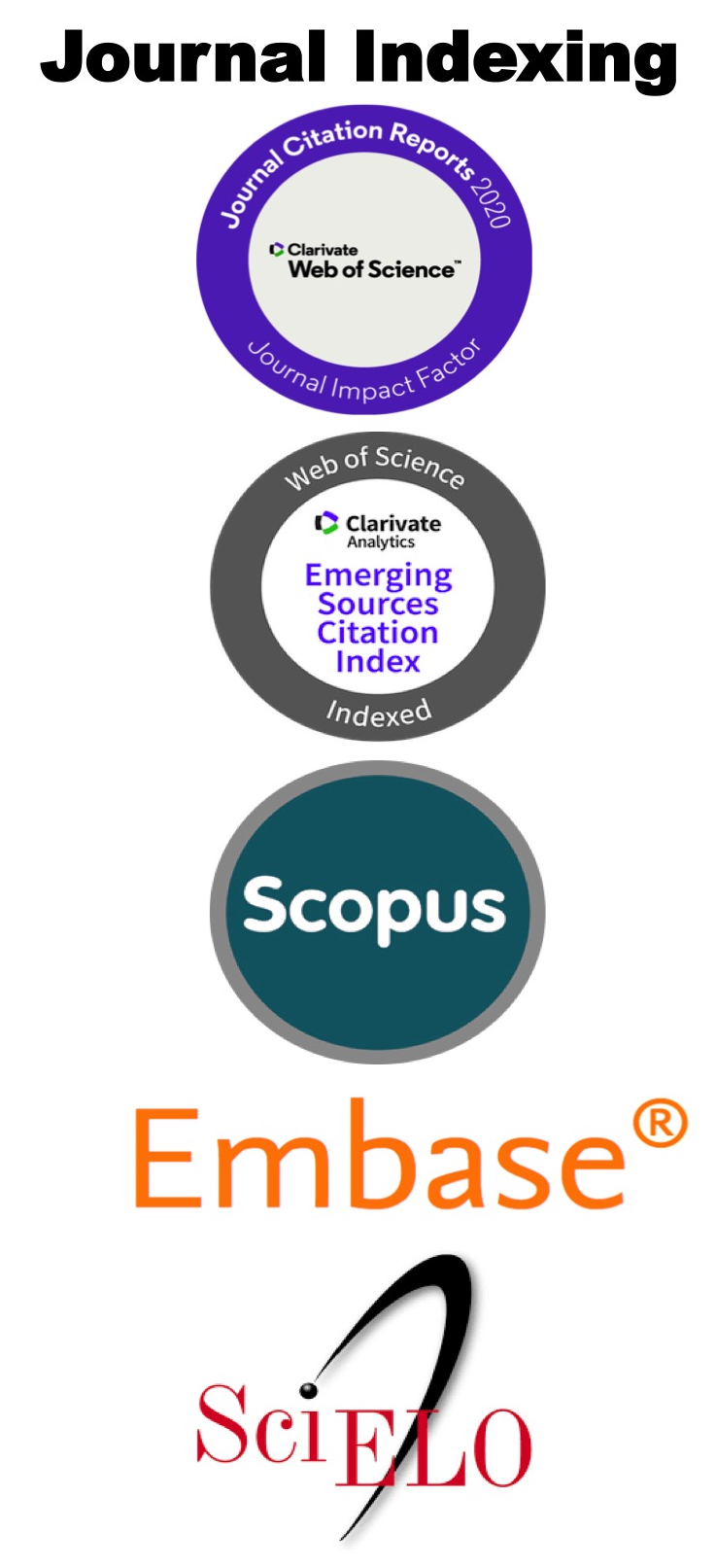Development of a Questionnaire to Describe Endodontic Treatments in Primary Teeth among Brazilian Dental Practitioners: Face and Content Validity
Keywords:
Pediatric Dentistry, Endodontics, Tooth, Deciduous, Surveys and QuestionnairesAbstract
Objective: To develop a questionnaire to describe endodontic treatments in primary teeth among Brazilian dental practitioners, focused on face and content validity (FCV). Material and Methods: An online validation process involved ten judges (panel of experts) and 32 dental practitioners (pre-test). The initial questionnaire (33 items) was developed after a literature review and divided into two parts: 7 questions for characterizing Brazilian dental practitioners (Part 1) and 26 questions for characterizing the endodontic treatment in primary teeth carried out by them (Part 2). The questionnaire was assessed for appearance, comprehension, and relevance using a 4-point Likert scale. Validity was achieved when the Validity Index was equal to or greater than 80% (0.8), considering responses 3 or 4 acceptable. Results: Two rounds were necessary for all items of the data collection instrument to be validated. The Validity Index for the entire instrument was established at 0.97 among the experts and 0.95 among the pre-test participants. The appearance, comprehension, and relevance criteria within the panel of experts achieved Validity Indices of 0.94, 0.97, and 0.99, respectively. The pre-test participants' values were 0.97, 0.94, and 0.94, respectively. The approximate response time for the data collection instrument ranged between 5-6 minutes. Within the expert panel, 70% of the judges rated the difficulty of filling it out as "easy." Among the pre-test participants, 56.3% judged it "very easy." Conclusion: After this validation process, the questionnaire has acceptable face and content validity and is uncomplicated and quick to fill out.References
Setzer FC, Kratchman SI. Present status and future directions: surgical endodontics. Int Endod J 2022; 55(Suppl 4):1020-1058. https://doi.org/10.1111/iej.13783
Gambarini G, Seracchiani M, D'Angelo M, Reda R, Testarelli L. Future trends in Endodontics: From the virtual assessment of the anatomy to the computer-driven approach. J Contemp Dent Pract 2020; 21(1):1.
Jouhar R, Ahmed MA, Almomen HAA, BuHulayqah AAJ, Alkashi MYA, Al-Quraini AAA, et al. Assessment of the current endodontic practices among general dental practitioners in the Kingdom of Saudi Arabia. Int J Environ Res Public Health 2022; 19(11):6601. https://doi.org/10.3390/ijerph19116601
Sørensen LH, Kirkevang LL. Establishment of a Danish endodontic practice-based research network: Baseline data. Acta Odontol Scand 2021; 79(4):302-308. https://doi.org/10.1080/00016357.2020.1857434
Alrahabi M, Zafar MS, Adanir N. Aspects of clinical malpractice in Endodontics. Eur J Dent 2019; 13(3):450-458. https://doi.org/10.1055/s-0039-1700767
Bansal N, Dogra M, Mehta P, Khan SA, Jhunjhunwala N, Gupta P. Perception, knowledge, and practice of endodontists and general dental practitioners toward evidence-based practice and factors associated with it - a cross-sectional study. J Family Med Prim Care 2020; 9(6):2958-2962. https://doi.org/10.4103/jfmpc.jfmpc_1132_19
Gizani S, Seremidi K, Katsouli K, Markouli A, Kloukos D. Basic behavioral management techniques in Pediatric Dentistry: A systematic review and meta-analysis. J Dent 2022; 126:104303. https://doi.org/10.1016/j.jdent.2022.104303
Tedesco TK, Reis TM, Mello-Moura ACV, Silva GSD, Scarpini S, Floriano I, et al. Management of deep caries lesions with or without pulp involvement in primary teeth: A systematic review and network meta-analysis. Braz Oral Res 2020; 35(1):e004. https://doi.org/10.1590/1807-3107bor-2021.vol35.0004
Acharya S. Knowledge and attitude of general and specialist dentist in Pediatric Dentistry: A pilot study in Odisha, India. Indian J Dent Res 2019; 30(2):170-174. https://doi.org/10.4103/ijdr.IJDR_428_17
Pinheiro HHC, Assunção LRS, Torres DKB, Miyahara LAN, Arantes DC. Endodontic therapy in primary teeth by pediatric dentists. Pesqui Bras Odontopediatria Clin Integr 2013; 13(4):351-360. https://doi.org/10.4034/PBOCI.2013.134.08
Barja-Fidalgo F, Julião GS, Oliveira MAA, Oliveira BH. Preferences of dentists from the city of Rio de Janeiro regarding the treatment of primary teeth with pulp necrosis. Pesqui Bras Odontopediatria Clin Integr 2010; 10(2):225-232. https://doi.org/10.4034/1519.0501.2010.0102.0015
Leon RJ, Lapkin S, Fields L, Moroney T. Developing a self-administered questionnaire: methods and considerations. Nurse Res 2022; 30(3):36-45. https://doi.org/10.7748/nr.2022.e1848
Liamputtong P. Research methods in health: Foundations for evidence-based practice. 2. ed. South Melbourne: Oxford University Press; 2010. 521p.
Goodfellow LT. An overview of how to search and write a medical literature review. Respir Care 2023; 68(11):1576-1584. https://doi.org/10.4187/respcare.11198
Verdejo C, Tapia-Benavente L, Schuller-Martínez B, Vergara-Merino L, Vargas-Peirano M, Silva-Dreyer AM. What you need to know about scoping reviews. Medwave 2021; 21(2):e8144. https://doi.org/10.5867/medwave.2021.02.8144
Angelo RL, Ryu RK, Pedowitz RA, Gallagher AG. Metric development for an arthroscopic bankart procedure: Assessment of face and content validity. Arthroscopy 2015; 31(8):1430-1440. https://doi.org/10.1016/j.arthro.2015.04.093
McElroy C, Esterhuizen P. Compassionate communication in acute healthcare: Establishing the face and content validity of a questionnaire. J Res Nurs 2017; 22(1-2):72-88. https://doi.org/10.1177/1744987116678903
Soares JE, Soares NL, Freitas BH, Bortolini J. Validation of an instrument for the evaluation of adolescents’ knowledge about Hansen’s disease. Acta Paul Enferm 2018; 31(5):480-488. https://doi.org/10.1590/1982-0194201800068
Schiller COA, Bellani WAGO, Moysés SJ, Werneck RI, Ignácio SA, Moysés ST. Face and construct validation of the Instrument of Evaluation of Maternal and Child Care Networks (IEMCN). Cien Saude Colet 2021; 26(Suppl 2):3657-3670. https://doi.org/10.1590/1413-81232021269.2.33872019
Oliveira F, Kuznier TP, Souza CC, Chianca TCM. Theoretical and methodological aspects for the cultural adaptation and validation of instruments in nursing. Texto Contexto Enferm 2018; 27(2):e4900016. https://doi.org/10.1590/0104-070720180004900016
Yusoff MSB. ABC of content validation and content validity index calculation. Educ Med J 2019; 11(2):49-54. https://doi.org/10.21315/eimj2019.11.2.6
Perneger TV, Courvoisier DS, Hudelson PM, Gayet-Ageron A. Sample size for pre-tests of questionnaires. Qual Life Res 2015; 24(1):147-151. https://doi.org/10.1007/s11136-014-0752-2
Moraes RR, Correa MB, Daneris A, Queiroz AB, Lopes JP, Lima GS, et al. E-mail vs. Instagram recruitment strategies for online survey research. Braz Dent J 2021; 32(1):67-77. https://doi.org/10.1590/0103-6440202104291
Pucinelli CM, Oliveira AA, Nelson-Filho P, Silva LAB, Castro GPA, Lima RB, et al. Online teaching, quality of life and anxiety of Brazilian dental professors during the COVID-19 outbreak. Braz Oral Res 2022; 36:e036. https://doi.org/10.1590/1807-3107bor-2022.vol36.0036
Drumm S, Bradley C, Moriarty F. 'More of an art than a science'? The development, design and mechanics of the Delphi Technique. Res Social Adm Pharm 2022; 18(1):2230-2236. https://doi.org/10.1016/j.sapharm.2021.06.027
Faggiano A, Carugo S. Can the implementation of electronic surveys with quick response (QR) codes be useful in the COVID-19 era? Int J Epidemiol 202; 49(5):1732-1733. https://doi.org/10.1093/ije/dyaa170
Christensen HQ, Linde BR, Bårdsen A, Vilhjalmsson VH, Haug SR. Influence of dental education on adoption and integration of technological aids in the delivery of endodontic care by dental practitioners: A survey. Acta Odontol Scand 2022; 80(8):611-618. https://doi.org/10.1080/00016357.2022.2071986
Burns LE, Gencerliler N, Gold HT. A comparative analysis of public and private dental benefit payer types for the provision and outcomes of root canal therapy on permanent teeth of children and adolescents in Massachusetts. J Am Dent Assoc 2023; 154(2):151-158. https://doi.org/10.1016/j.adaj.2022.10.011
Barasuol JC, Garcia LP, Freitas RC, Dalpian DM, Menezes JVNB, Santos BZ. Dental care utilization among children in Brazil: an exploratory study based on data from national household surveys. Cien Saude Colet 2019; 24(2):649-657. https://doi.org/10.1590/1413-81232018242.03232017
Gomes MAG, Abreu MHNG, Ferreira FM, Fraiz FC, Menezes JVNB. No-shows at public secondary dental care for pediatric patients: A cross-sectional study in a large Brazilian city. Cien Saude Colet 2019; 24(5):1915-1923. https://doi.org/10.1590/1413-81232018245.19312017
Downloads
Published
How to Cite
Issue
Section
License
Copyright (c) 2024 Pesquisa Brasileira em Odontopediatria e Clínica Integrada

This work is licensed under a Creative Commons Attribution-NonCommercial 4.0 International License.



